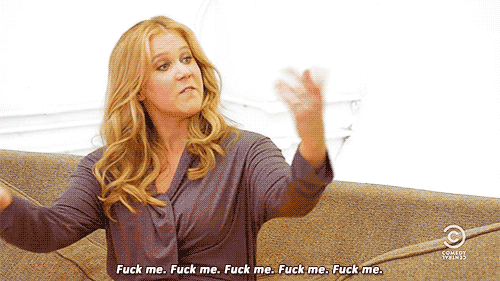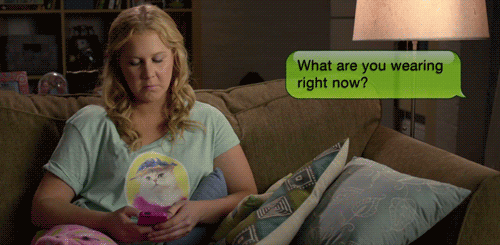Vulgarity: A “Boy’s
Club” Style of Comedy
 When asked if she was annoyed by comments that audiences
were surprised by the success of the film Bridesmaids due to the all female
cast, Maya Rudolph responded “It is a little lame to me, yeah, because I’ve
been doing comedy for a long time and I never thought it was vaginal comedy” (E!
Entertainment, 2011). Famous men such as William Congreve, John Belushi, Jerry
Lewis and many more have made definitive statements that women simply aren’t
funny (Delingpole, 2014). Their
reasoning behind this argument varies, but the reason may not be what is most
important.
When asked if she was annoyed by comments that audiences
were surprised by the success of the film Bridesmaids due to the all female
cast, Maya Rudolph responded “It is a little lame to me, yeah, because I’ve
been doing comedy for a long time and I never thought it was vaginal comedy” (E!
Entertainment, 2011). Famous men such as William Congreve, John Belushi, Jerry
Lewis and many more have made definitive statements that women simply aren’t
funny (Delingpole, 2014). Their
reasoning behind this argument varies, but the reason may not be what is most
important.
It seems that society has only just begun to accept the idea
that women can be as funny as men.
Though this may seem like a step towards equality among the sexes, there
are still huge strides that need to be made. Although women comics are now more widely accepted and maybe
even encouraged, audiences are still surprised when a female doesn’t stick to a
prim and proper routine. There
seems to be a “boy’s club” of comedy style, and when women present jokes and
other forms of comedic entertainment in a similar way, many viewers find it
unnatural. This begs the question:
are we truly in a post-feminist society, or is the gender-gap still alive and
well?
As someone who truly believes there needs to be equality
among the sexes, I was shaken by a recent conversation I had with a professor
of mine. We were discussing one of
my favorite shows, Inside Amy Schumer. I said how much I enjoyed the show, and
that I loved how a female comic was being viewed as an equal among the male
dominated profession. I then
expressed my curiosity of whether Amy Schumer’s show would be as successful if
she didn’t employ such a “male-type” style of humor. My professor stopped me there and asked me to consider what
I had just said: if I truly believe that women and men should be viewed
equally, why did I consider Amy Schumer to have a “masculine” style of
comedy? This made me think.
To give some background and an explanation as to why I, and
many others, view Amy Schumer as a “masculine” female comic, I will describe a
few scenes and episodes of Inside Amy
Schumer:
 The first example is a segment in an episode titled Lunch at O’Nutters. This skit is a satirical
take of sorts on the restaurant Hooters. At O’Nutters however, instead of tight
shirts and push-up bras, the male employees wear tight leotards to emphasize
their well-endowed “package”. The
women constantly gawk at the men and the emphasized body-part similar to the
way men stare at Hooters waitresses’ accentuated chest. This skit is clearly a comment on how
ridiculous people may view Hooters.
Additionally though, by having the women stare and objectify men, she is
taking on a “male” persona. But
even saying that this is a male persona is an issue. Besides the way this skit pokes fun at the restaurant
Hooters, it’s really not that far off when it comes to many women. Like men, women are human beings with
sexual desires. Is the fact that
Amy stares at the waiter’s junk funny because she is a woman and viewers believe
this never happens? Surely women
do not ever accidentally look at a man’s package right?!
The first example is a segment in an episode titled Lunch at O’Nutters. This skit is a satirical
take of sorts on the restaurant Hooters. At O’Nutters however, instead of tight
shirts and push-up bras, the male employees wear tight leotards to emphasize
their well-endowed “package”. The
women constantly gawk at the men and the emphasized body-part similar to the
way men stare at Hooters waitresses’ accentuated chest. This skit is clearly a comment on how
ridiculous people may view Hooters.
Additionally though, by having the women stare and objectify men, she is
taking on a “male” persona. But
even saying that this is a male persona is an issue. Besides the way this skit pokes fun at the restaurant
Hooters, it’s really not that far off when it comes to many women. Like men, women are human beings with
sexual desires. Is the fact that
Amy stares at the waiter’s junk funny because she is a woman and viewers believe
this never happens? Surely women
do not ever accidentally look at a man’s package right?!
Another episode entitled Boner Doctor is a commercial
parody that mentions the side effects of male-enhancement drugs. She offers a service to men with erections
lasting longer than four hours stating: “If you have an erection lasting more
than four hours-CALL ME!”
This is
also shocking to many viewers. And
this shock factor may be the reason so many find it funny. However, similar to the O’Nutters skit,
we have to remember that some women don’t watch it and laugh because of how
outrageous and unlikely it is. For
many women they find it humorous because they can relate to times when they
just want to hook up with someone.
(Gasp! Women never want a casual hook-up!)
In addition to the sexually charged skits, Inside Amy
Schumer features snippets of Amy’s standup comedy. In these performances, Amy calls out
male audience members (often asking about their penis or how they are in bed)
makes vulgar comments about men and women, talks about using the Morning After
Pill, and much more controversial content. While people seem to genuinely enjoy this segment of the
show as well as Amy’s tour and are truthfully extremely supportive of her
career and all she has accomplished, are they excited for her because of her
talent or because she is talented IN SPITE of being a woman?
Now, there is no denying that these examples prove the
vulgarity of Inside Amy Schumer; and they also demonstrate just how
popular Amy Schumer’s show has become.
However, the issue at hand is not about whether a viewer enjoys vulgar
humor or not. The issue is whether vulgar humor is seen as a gendered
style.
It is 2014. It
is time we stop pretending that women don’t burp, fart, or poop. These are uncontrollable things that
happen inside of the HUMAN body.
On that same token, we need to open our eyes and realize that women and
men share many of the same experiences.
Not every woman will relate to every man but at the same time not every
woman relates to every woman.
There is no doubt in my mind that Amy Schumer is playing a large role in
neutralizing the way gender is viewed in comedy. However, until comedy
television will be completely gendered we need to change our dialogue. Amy Schumer is not just funny for a
girl. Amy Schumer is a funny human being.
Works Cited
Delingpole, James. "Women Aren't As Funny As Men: But
Why Rub It In With Sexist Quota Systems?"
Breitbart. N.p., 27 Feb. 2014. Web. 14 Apr. 2014.
<http://www.breitbart.com/
Breitbart-London/2014/02/26/
Women-aren-t-as-funny-as-men-by-why-rub-the-point-in-with-sexist-quota-systems>.
Maya Rudolph | Chelsea Lately. YouTube.
N.p., 18 May 2011. Web. 4 Apr. 2014.
<https://www.youtube.com/watch?v=gyUpcsDr2KE>.



No comments:
Post a Comment
Note: Only a member of this blog may post a comment.